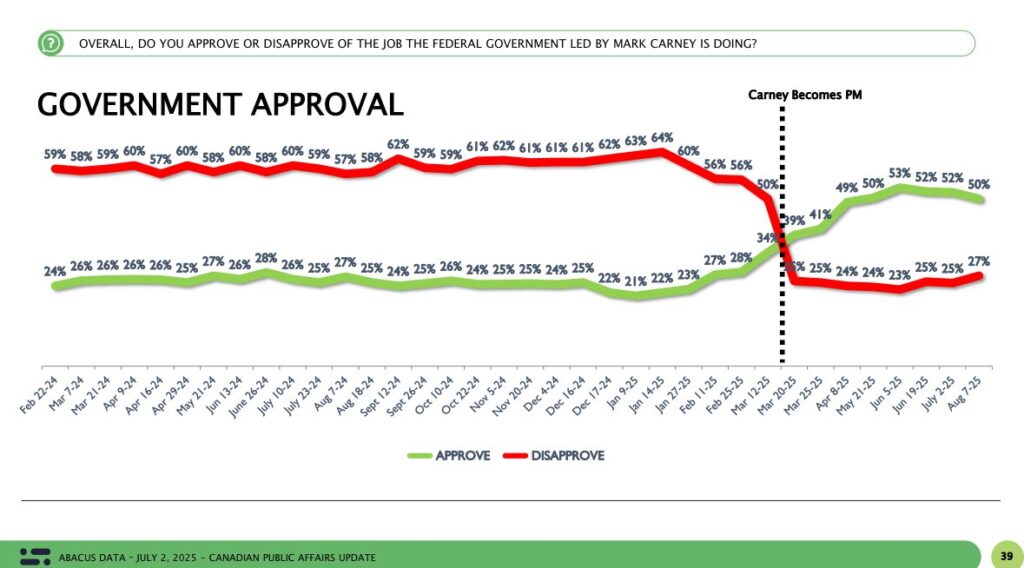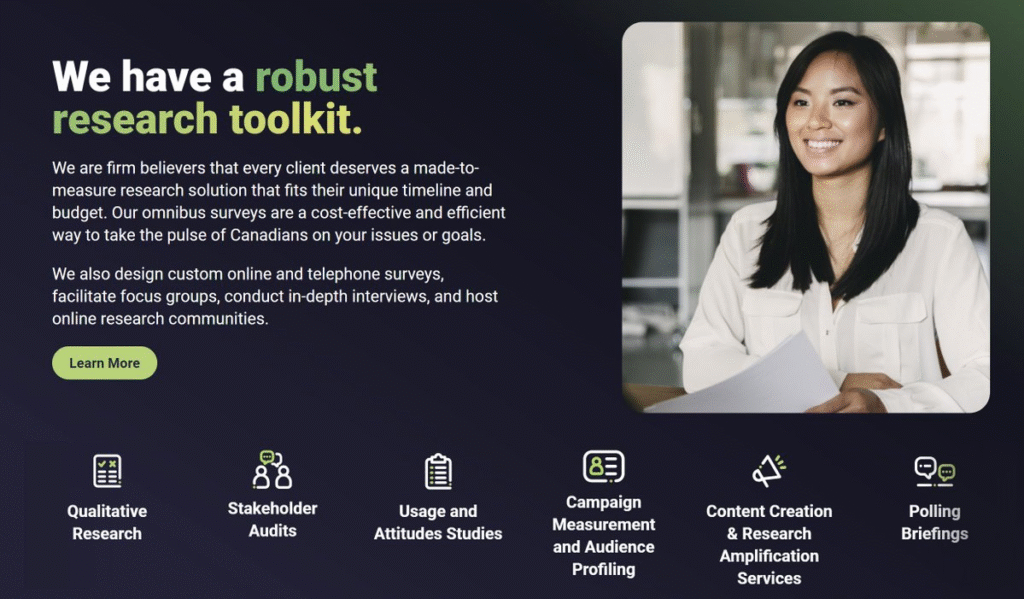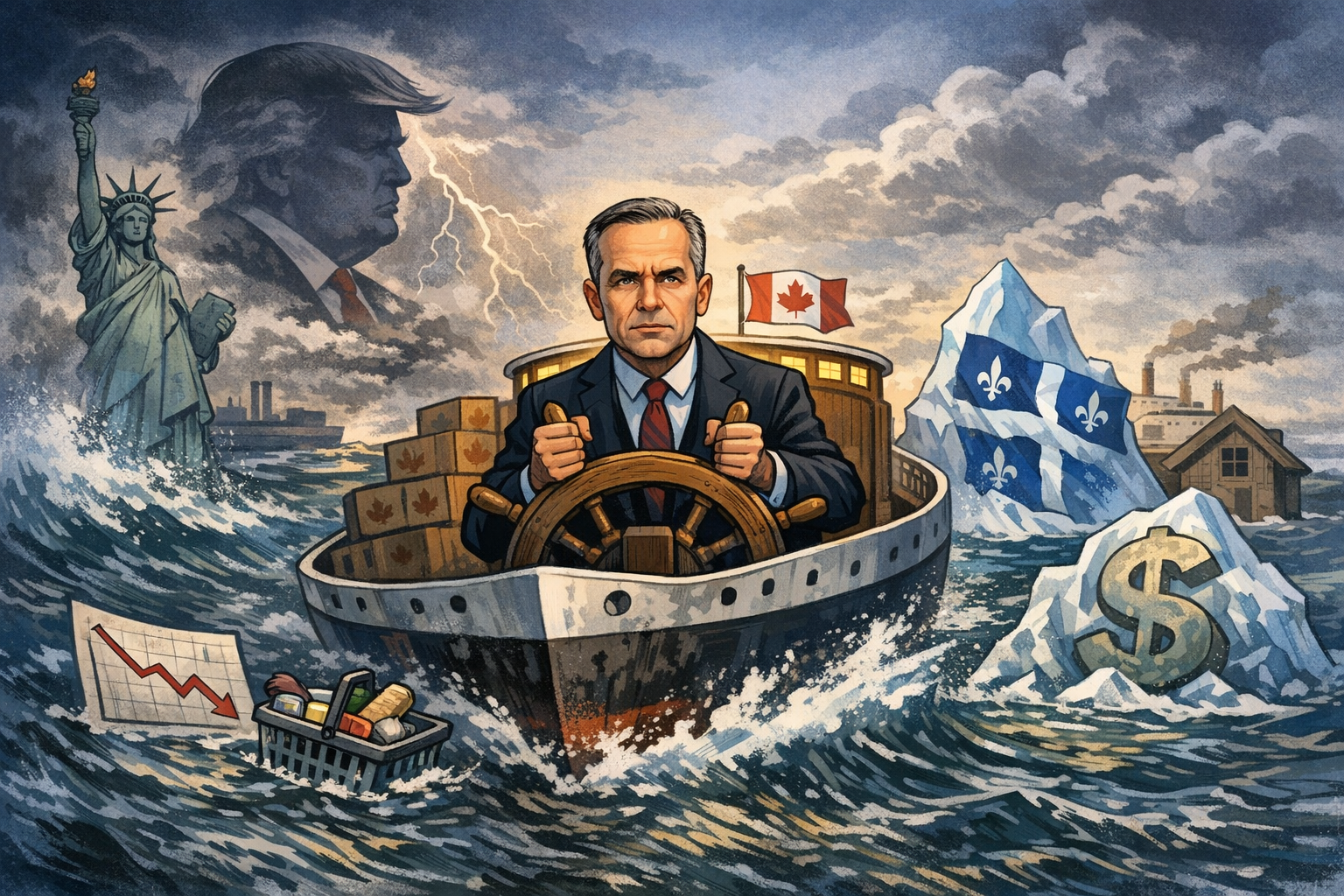Communicating Hard Choices in a Fragmented Age: Lessons from the Air Canada Strike
August 18, 2025
The strike at Air Canada is now a test of how governments deal with unpopular decisions in real time. Our polling shows most Canadians side with the flight attendants, agree they should be paid for all aspects of their workday, and oppose Ottawa forcing them back. That reaction makes sense. People are already stretched thin by the cost of living, housing pressures, and job insecurity. In that environment, a government decision that looks like it weakens workers’ leverage is always going to be a tough sell.
This strike highlights more than just a labour dispute. It shows the limits of trust, the way our fragmented information ecosystem makes communication harder, and how expectations have shifted from the Trudeau years to the Carney government. It also reminds us why research is essential, not just to know what people think, but to understand why they react the way they do.
1. Communicating unpopular decisions
When a government steps in during a strike, the instinct is to lean on the legal authority it has, on economic arguments, or on safety concerns. But Canadians don’t start there. They start by asking: who is losing out? Right now, that’s workers who already feel precarious and travellers whose plans are disrupted.

The best way to explain an unpopular decision is to start with that reality: acknowledge the harm, be upfront about the alternatives that were tried, and be clear about why this step is necessary now and at this very moment. People want to see fairness. They want to believe government understands the trade-offs, not just the economics. Competence matters, but empathy matters too.
2. A fragmented information ecosystem
Another big challenge is the way information spreads today. Travellers are hearing about cancelled flights from airline apps and alerts. Workers and their supporters are trading news through union networks and creator commentary. Many Canadians are catching the story through TikTok, Instagram, or YouTube clips (1 in 4 Canadians under 30 say their primary news source is TikTok).
That fragmentation makes it harder for government to set the narrative. By the time Ottawa issues a press release or holds a press conference, people have already seen their feeds fill with first takes. This is true of this case more than others.
The solution is to treat every announcement as a set of smaller conversations. Different audiences need different explanations, and they live on different platforms. Visuals, timelines, and straightforward explanations travel better than legal jargon or talking points.
3. The limits of trust
In our research, trust is built on four things: openness, fairness, responsibility, and results. Right now, all four are being tested.
Governments often fall back on competence: “We’ve got this under control.” But that isn’t enough. Competence without fairness sounds indifferent. People want to see limits on government power, independent oversight, or commitments to fix the underlying issue. Those signals show government isn’t just acting efficiently, but also fairly.
Canadians don’t expect to agree with every decision. They just want their leaders to show their work and prove the process was even-handed and well thought-out.
4. Trudeau vs. Carney: new expectations
The political context matters. By the end, Justin Trudeau’s government was defined by fatigue. People doubted its ability to deliver. Mark Carney came in promising stability, reassurance, and competence.
Voters don’t see a straight line from Trudeau to Carney.

That changes how Canadians judge his government. When the brand promise is “I’ll make you feel secure,” decisions that feel heavy-handed toward workers cut against the grain. Canadians want order, but they want order in the service of certainty and fairness, not at the expense of it.
This is the risk Carney faces now. The benefits of intervention may seem to have been quick, but are actually abstract. The costs became immediate and visible (on-going labour conflict). The decision feels like a break from the very promise that helped him win.
5. Why research matters
Polling is giving us the headline numbers: sympathy for flight attendants, opposition to intervention.
But we need to go deeper and game out scenarios before decisions are made. Rapid research, like we did for CUPE, helps make better decisions.
We need to know things like:
What’s the threshold at which Canadians accept government intervention?
Which safeguards make a decision feel fairer?
Which messengers—regulators, arbitrators, experts—help shift opinion?
Who gets the credit or blame if the strike ends?
And how do messages travel differently on TikTok versus LinkedIn or traditional news?
This isn’t just curiosity. It’s how governments, unions, and businesses can anticipate where public patience will run out and how to explain decisions before it does.
The upshot
Unpopular decisions can be explained, but only if government starts with the harm, not the justification.
Fragmentation makes first impressions stick. Communication has to meet people where they are.
Trust isn’t limitless. Competence without fairness won’t cut it.
Expectations have shifted. Carney is judged against his promise of reassurance and no-drama.
Research is essential. We need to keep mapping how people process these disputes.
The strike is still unfolding, and Canadians are watching closely. The real question isn’t just whether flights get back on schedule. It’s whether people believe their government acted fairly, reluctantly, and transparently when faced with a hard choice.

ABOUT ABACUS DATA
We are Canada’s most sought-after, influential, and impactful polling and market research firm. We are hired by many of North America’s most respected and influential brands and organizations.
We use the latest technology, sound science, and deep experience to generate top-flight research-based advice to our clients. We offer global research capacity with a strong focus on customer service, attention to detail, and exceptional value.
And we are growing throughout all parts of Canada and the United States and have capacity for new clients who want high quality research insights with enlightened hospitality.
Our record speaks for itself: we were one of the most accurate pollsters conducting research during the 2025 Canadian election following up on our outstanding record in the 2021, 2019, 2015, and 2011 federal elections.
Contact us with any questions.
Find out more about how we can help your organization by downloading our corporate profile and service offering.



